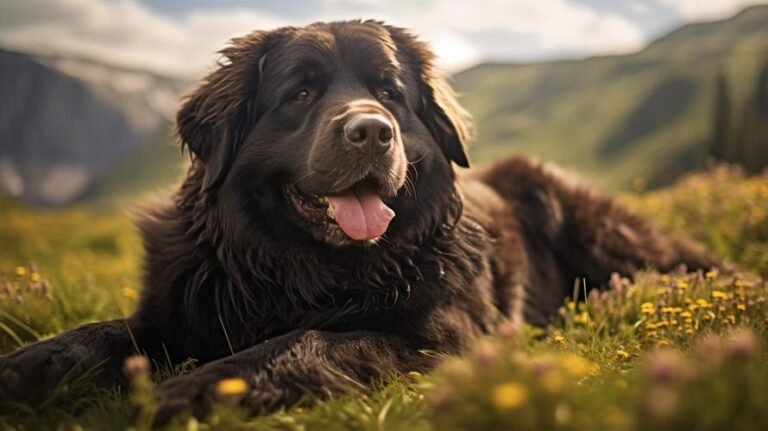Newfoundland dogs are actually known as gentle giants. Can you believe it? Despite their size, they are so tender-hearted, gracious, and fundamentally kind that they are often described as “nanny dogs” owing to their inherent tenderness towards children. It’s not your everyday trivia, isn’t it? But the world of Newfoundland dogs is full of surprises. So, let’s dive straight in and explore.
Wondering why such a huge dog with massive strength is considered gentle? The answer is hidden in their origins. Newfoundland dogs were bred on Newfoundland Island, Canada, for rescue and working purposes. Locals needed dogs who would assist fishermen—hauling nets and carting loads—while also being family companions. Thus, it’s in their genes to be strong yet gentle. So, by nature, Newfoundlands are not dangerous dogs; they are loving and docile animals with a natural inclination towards being helpful.
However, like any other large breed, these sweet-hearted Newfies have strength and size which, if uncontrolled, could potentially be dangerous. The danger usually roots not in the breed, but in an individual dog’s upbringing and training.
An ill-trained Newfoundland dog, like any other poorly trained dog, can certainly be a hazard due to its sheer size and strength. But don’t worry, there is a lot a potential dog-owner can do, and it all comes down to two things – socialization and training.
Early socialization is vital to shape a puppy’s temperament. Arrange for your pup to meet as many different people and animals as you can. The goal is to get them used to meeting strangers without fear or aggression. Never punish your puppy for being scared. Understand their fear and slowly get them used to the situation without forcing them into it.
Training is crucial for every breed, but even more so for large breeds. Large dogs need to learn to control their strength early. Remember, your puppy will grow into a big, strong dog, potentially capable of pulling more than you can handle. Starting agility or obedience classes at an early age will help them control their strength and guide their behavior socially.
The next important factor is their health. In general, Newfoundland dogs risk developing hip or elbow dysplasia, sub-aortic stenosis, and eye-related problems. These health conditions can alter the behavior of your Newfoundland dog, possibly making them snappy or less tolerant. Regular veterinary check-ups and maintaining their health is the key to keep their naturally sweet disposition intact.
Always remember, large breeds like Newfoundlands need both mental and physical stimulation to channel their energy positively. Long walks and exploration trips will ensure your “Newfie” uses their energy wisely and positively. They are curious creatures, and keeping their mind occupied will keep them at their best behavior.
Additionally, Newfoundlands are water dogs at heart. With their big webbed feet and muscular body, they are born swimmers. If you are fortunate to live near a body of water, swimming is a fantastic exercise for them. However, make sure you are ensuring their safety and controlling their swimming habits.
Despite their sweet and docile nature, a Newfoundland dog is not for everyone. They require patience, understanding, commitment, and, above all, a whole lot of space. Think twice before you decide to bring one home. Analyze if you are capable of handling their size and strength, have enough space, and can provide the environment that will nurture their gentle spirit.
There’s an old Newfie saying that says, “The white man may have invented work, but it’s the Newfoundland dog that practices it”. This well-loved breed is known to strive for work and play in equal measures. They are the champions, the gentle-hearted workers, and the endearing companions that carefully tread the line between strength and gentleness.
So, if you’re thinking, ‘Is Newfoundland a dangerous dog?’ you can rest assured that by nature, they are gentle beasts. Any danger emanates from improper upbringing and ill-health. With the right care, a Newfoundland would be more of a big cuddly family member than a threat.
But remember, with great ‘Newfie’ comes great responsibility. The secret is not just about training them, but loving them, guiding them, and above all, understanding their nature and spirit.
Newfies are lovers, not fighters, and with the right care, they turn out to be perfect gentle giants. So, let their sweet-hearted nature bloom with love, care, and gentle guidance, assuring their human companion of a big, fluffy charge of loyalty.


